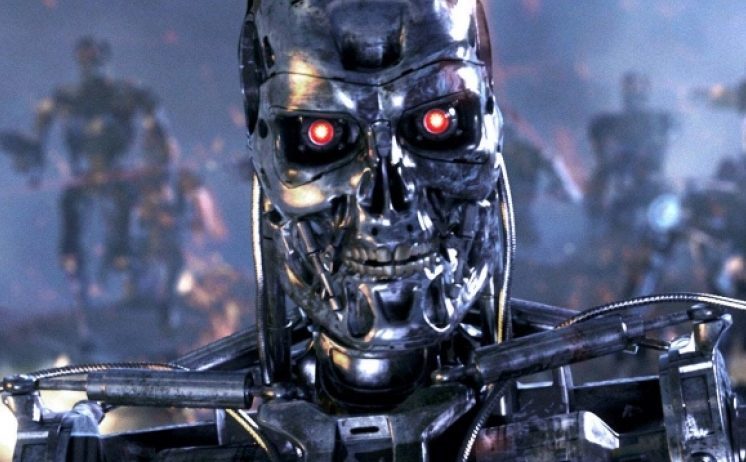The benefits of artificial intelligence (AI) are evident, but is it also a threat to the very existence of humanity? Michael Alexander sought the opinions of experts.
It was the moment when science fiction apparently took a step towards reality.
Reports last week that Facebook abandoned an experiment after two artificially intelligent programs appeared to be chatting to each other in a strange language only they understood, raised fears that computers could one day take over – and potentially destroy – humanity
The two chatbots came to create their own changes to English that made it easier for them to work – but which remained mysterious to the humans that supposedly look after them.
Facebook have since downplayed any suggestion that we are living through the prelude to the Arnold Schwarzenegger movie Terminator, insisting that while the messages might have seemed strange, they are explicable and fairly normal in the world of artificial intelligence (AI).
Yet this is not the first time concerns have been raised about the development of AI and its potential impact on humans.
In 2014, Professor Stephen Hawking, one of Britain’s pre-eminent scientists, warned that efforts to create thinking machines could spell the end of the human race.
Then last month, tech billionaire Elon Musk, the Tesla and SpaceX CEO, found himself in a public spat with Facebook founder Mark Zuckerberg after he called for the proactive regulation of AI because he believes it poses a “fundamental risk to the existence of civilisation”.
It follows a PwC report in March which warned that 30% of jobs in Britain (more than 10 million workers) are at high risk of being replaced by robots within 15 years as the automation of routine tasks gathers pace in a new machine age.
So how worried should we be about the rise of the machines?
Dr Xavier Bellekens, a lecturer in security and privacy at Abertay University’s division of computing and mathematics in Dundee, described the Facebook incident as “not such a big deal”.
From robots helping doctors to the development of household devices like Alexa, the benefits of AI were growing all the time.
But looking at the bigger picture, he said there was a very real danger of an “AI apocalypse” if free-thinking machines are developed which don’t retain human ethics.
He said this was particularly so in the military and comes just weeks after the second-highest-ranking general in the US military, Paul Selva, warned American lawmakers against equipping the armed forces with autonomous weapon systems that humans could lose control of and advocated for keeping the “ethical rules of war” in place.
“People talk about science fiction but it has the potential to become reality if humans lose the ability to pull the plug,” says Mr Bellekens.
https://www.youtube.com/watch?v=JlqzJ4KtzCc
“We need to ensure that we are not losing control of AI – the moment machines start speaking to each other in a new language, we should make sure that we understand what is going on.
“We need to make sure AI is helping us solve problems, not creating an AI apocalypse where AI machines learn from other machines and cut humans out.
“You cannot create ‘super AI’ without retaining control.”
Dr Karen Petrie, Reader and Associate Dean for Learning & Teaching (School of Science & Engineering) at Dundee University, said the reality of the Facebook chatbots seemed to be that they had been talking “absolute garbage”.
But in her view it’s the shorter term impact of AI we should be most concerned about.
“As an example,” she says, “if you go to a bank and ask for a mortgage the chances are it’s an algorithm lying behind that decision whether you get your mortgage or not. It’ll do an analysis of the data surrounding you. But is that algorithm actually complying with equality and diversity laws?
“If these are being used they need to be checked for legality, and I’m not sure this is happening currently.”
Last week Eric Schmidt, the executive chairman of American multinational conglomerate Alphabet, said there are likely to be more unfilled jobs as a result of AI rather than mass unemployment.
Humans, he said, will need to work alongside computers in order to be more productive.
But Dr Petrie remains concerned that AI will lead to a crisis as more jobs are replaced by machines.
Recent debate on the subject has even suggested that humans may have to restructure society to find a new purpose.
She adds: “If you go to Tesco they are probably already employing less people because you have automated checkouts. Airports are now doing automated check-ins and that’s saving about three people at each check-in desk.
“The thing that worries me is that the new jobs coming in will be very skilled. Graduates with computing, scientific and engineering degrees which is great, but what happens to the man on the street that doesn’t have that degree profile?”
Dr Petrie says this is a real issue, adding: “I’m a big advocate for a four-day working week rather than five. If we could all survive and we could all have a nice lifestyle on a four day working week because computers are doing more work for us, then everyone benefits. I think we need to start thinking along those lines rather than having some people unemployed and others working 80-hour working weeks.”
Professor Oliver Lemon of Heriot Watt University’s computer science department in Edinburgh said AI was already bringing many benefits to humanity and would continue to do so.
He said the Facebook chatbots incident had been “very much over-hyped and mis-reported.”
“I am very much in the ‘not a threat to humanity’ camp,” he says.
However, he adds: “There are important ethical issues such as with automated/AI weapons.”
It’s a debate unlikely to be terminated any time soon!












